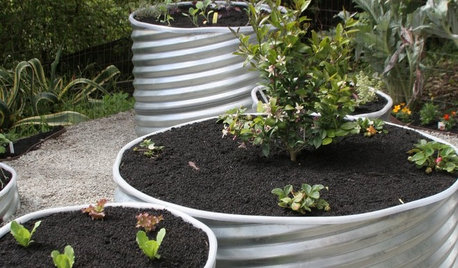Soil Ph and nurtient availability
Mike Larkin
19 years ago
Related Stories

CONTAINER GARDENSContainer Gardening Basics: The Dirt on Soil
Learn the types of potting soil available and the best mixes to help your containers thrive
Full Story
FARM YOUR YARDHow to Get Good Soil for Your Edible Garden
The nutrients in your soil feed the plants that feed you. Here are tips on getting it right — just in time for planting season
Full Story
GARDENING GUIDESGardening Solutions for Heavy Clay Soils
What’s a gardener to do with soil that’s easily compacted and has poor drainage? Find out here
Full Story
GARDENING GUIDESHow to Stop Worrying and Start Loving Clay Soil
Clay has many more benefits than you might imagine
Full Story
GARDENING GUIDESGarden Myths to Debunk as You Dig This Fall and Rest Over Winter
Termites hate wood mulch, don’t amend soil for trees, avoid gravel in planters — and more nuggets of garden wisdom
Full Story
FALL GARDENING5 Ways to Put Fall Leaves to Work in Your Garden
Improve your soil and yard the organic way with a valuable garden booster that grows on trees
Full Story
EDIBLE GARDENSNatural Ways to Get Rid of Weeds in Your Garden
Use these techniques to help prevent the spread of weeds and to learn about your soil
Full Story
GARDENING GUIDESGet on a Composting Kick (Hello, Free Fertilizer!)
Quit shelling out for pricey substitutes that aren’t even as good. Here’s how to give your soil the best while lightening your trash load
Full Story
GARDENING GUIDESCommon Myths That May Be Hurting Your Garden
Discover the truth about fertilizer, soil, staking and more to keep your plants healthy and happy
Full Story
TREESGreat Design Plant: Nyssa Sylvatica
The black gum tree tolerates moist soil and provides many years of beautiful foliage, from summer to fall
Full Story






The_Mohave__Kid
Mike LarkinOriginal Author
Related Professionals
New Bedford Landscape Architects & Landscape Designers · Allentown Landscape Architects & Landscape Designers · Erie Landscape Architects & Landscape Designers · Fort Lee Landscape Architects & Landscape Designers · Severn Landscape Architects & Landscape Designers · Forest City Landscape Architects & Landscape Designers · Essex Landscape Contractors · Longmont Landscape Contractors · Morrisville Landscape Contractors · Shoreview Landscape Contractors · Wethersfield Landscape Contractors · Buena Park Fence Contractors · Leander Fence Contractors · Oldsmar Fence Contractors · Sammamish Fence ContractorsThe_Mohave__Kid
lycopus
Mike LarkinOriginal Author
Josh
The_Mohave__Kid
lycopus
kdjoergensen
The_Mohave__Kid
happyhoe
The_Mohave__Kid
bluemill
kdjoergensen
patusho25
botanybob